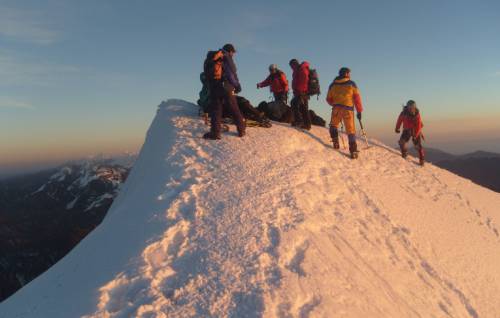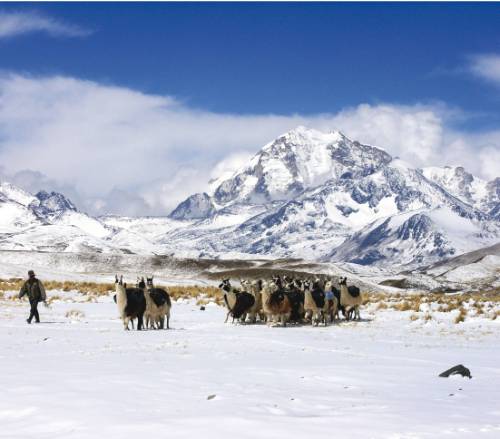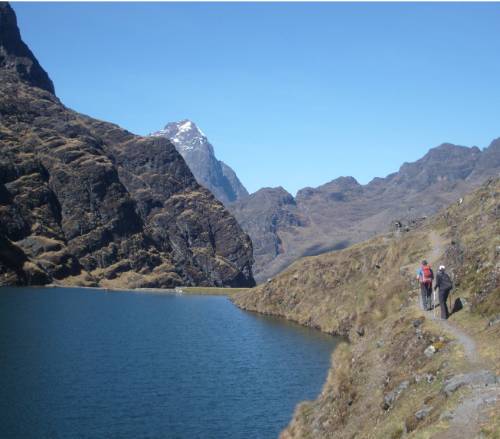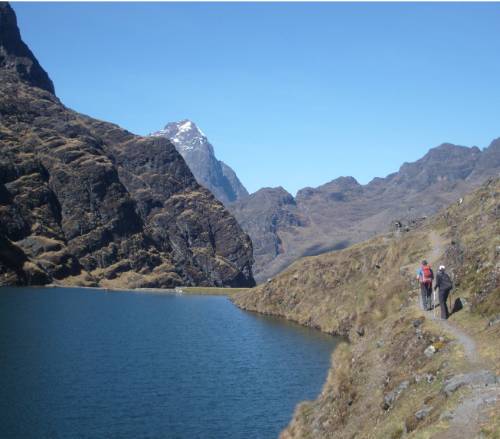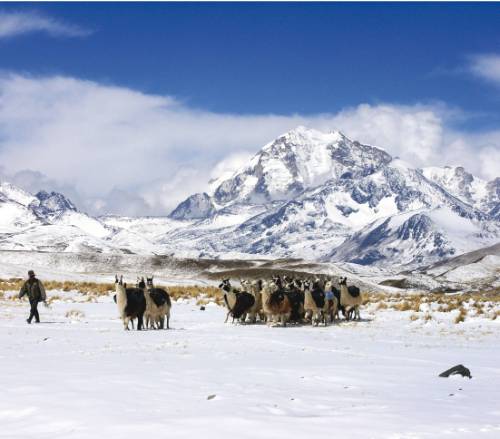Summits of Bolivia
Summits of Bolivia
$3960
Summits of Bolivia
19 Days Starting and ending in La Paz, Bolivia
Visiting: La Paz, Copacabana, Condoriri, Kunturiri, Huayna Potosi, Illimani
Tour operator:
Tour code:
SOB
Guide Type:
Fully Guided
Group size:
3 - 12
Tour operated in:
EnglishTrip Styles:
Activities:
Tour Overview
Embark on an exhilarating adventure with the "Summits of Bolivia" tour, where you'll conquer the majestic twin peaks of Huayna Potosi and Illimani, standing at 6088m and 6438m respectively. This journey through Bolivia's breathtaking Cordillera Real offers a unique blend of trekking and mountaineering, with expert guides providing two days of alpine climbing instruction to enhance your skills. Acclimatize to the altitude with scenic hikes on the Isla del Sol at Lake Titicaca, and explore the vibrant city of La Paz. Experience the stunning landscapes of the Condoriri region and enjoy the support of a small group setting. With all necessary climbing permits, safety equipment, and local guides included, this tour promises an unforgettable adventure for seasoned trekkers and aspiring mountaineers alike.
Highlights
Itinerary
Day 1 : Arrive La Paz (3600m)
Location: La Paz
Accommodation: Hotel
You will be met and transferred from La Paz Airport to the group hotel. El Alto airport is the highest international airport in the world at an altitude of 4058m, and it is with relief that we descend into the great bowl of La Paz to the group hotel. We will need to take it easy for the first few days of this trip, in order for the group to acclimatise to the altitude. Most people will want to rest for a few hours on arrival. In the evening there is no need to venture further than a nearby restaurant, although those who are feeling more energetic can always wander around the fascinating surrounding area. La Paz is a remarkable city, with its steep, narrow streets radiating upwards from the main thoroughfare of the Prado. There are lots of plazas and markets, and a number of museums and grand cathedrals. In the afternoon we will organize a meeting for a full briefing for the expedition; please check at hotel reception for meeting details.
Day 2 : La Paz city tour
Location: La Paz
Accommodation: Hotel
This morning we will undertake a city tour of La Paz. Beginning our tour at 8:00am we head to Plaza Murillo, a gathering place most connected to the political life of Bolivia. Continuing on to Jaen Street showcasing the colonial architecture of the 16th century in La Paz before visiting the Museum of Music and trying our hand at some of the local instruments. On the other side of town we will venture by the Indian market to look at the great variety of fresh goods from the different regions. Next to the Mercado de Hechicería, or the Witches Market, where various potions, mesas and amulets are dispensed for you. Finally we will assist our acclimatisation process with a short hike to enjoy the splendid view over the mountains and sandy spires of the famous Moon Valley (Valle de la Luna). Return to the city by cable car, flying over the city of La Paz enjoying impressive panoramic views.
Day 3 : To Copacabana (3840m) and transfer to Island of the Sun
Location: Copacabana
Accommodation Name: ecolodge
Meals Included: Lunch, Dinner
Our journey will take approx 4hrs by road to Copacabana via Tiquina Straits. Along the way we will visit the museum of Paulino Esteban, the Bolivian Indian that built for Heyerdal the boat RA II, which successfully crossed the Atlantic ocean. We will enjoy this fascinating history, and also learn how these kind of reed boats are made using the totora reed, which is endemic to the Andes. We will arrive in Copacabana (3825m), located on the shores of Lake Titicaca, around midday. This is a beautiful town, and a popular resort and pilgrimage area. At the beach of Copacabana, our motor boat will be waiting to take us (approx 1 hour) to the extreme southern side of the Sun Island (Isla del Sol), where we will land near an Inca temple called Pilkokaina. We will go to a local restaurant with superb views over the lake and enjoy a late lunch (typical Andean menu). Afterwards we will visit the Pilkokaina temple, followed by an hour's walk to the ecolodge. After we check in to our accommodation, we will have a traditional tea/chat time at 17:00 followed by a walk up to the highest point of the island (4070m) to experience a magnificent sunset over the lake. Return to the ecolodge for dinner and overnight accommodation.
An important region for Aymaran and Incan history is on the Bolivian shores of Lake Titicaca. The Copacabana peninsula and nearby islands were once the ceremonial and administrative centres during the Incan and pre-Incan periods. Stunningly beautiful, the Island of the Sun, where legend tells that it was here the Sun was born, became a sanctuary for pilgrims who flocked there via Copacabana. Copacabana is of significance also to locals of both past and present - since the late 16th Century miracles and healings have been performed at the church set by the lake. The azure blue waters and rugged coastline of Isla del Sol make a beautiful natural setting to explore for a couple of days without hordes of tourists. It is a wonderful opportunity to interact with people typical of the area as they go about their daily chores.
Day 4 : Hiking Sun and Moon Island
Location: Copacabana
Accommodation: Hotel
Meals Included: Lunch
This morning, from the hotel, we have an hour walk before we arrive at the Inca Garden with a spring considered by the locals as the fountain of youth. Our boat will be waiting here to take us across to Moon Island where we visit Aclla Huasi, the temple of the Inca virgins which was used to educate girls to be sacrificed at 16years of age. We walk along the backbone of the island to enjoy superb views of Illampu and Ancohuma mountains. Catching the boat again we move to the floating islands of the Urus where our crew will catch trout and prepare our lunch. Afterwards we return to Copacabana. Overnight hotel in Copacabana.
Day 5 : Transfer to Condoriri.
Location: Condoriri
Accommodation Name: camp
Meals Included: Lunch
Early morning visit to the Indian market and the church that houses the Virgen de Candelaria - the religious Madonna of Copacabana. Then we will commence our trip to the mountains with a 4 hour drive crossing the rolling plains of the Altiplano, with tremendous views of the Cordillera Real, mainly the Illampu and Ancohuma massifs. In the last hour of the drive we will enter the high mountain valley of Condoriri, with wonderful views over soaring snow capped spires in a glacially eroded valley beneath the Wings and the Head of the Condor. Finally we will reach the road head at Rinconada del Cuchi (4450m). After a picnic lunch, we will take a leisurely walk (approx 2 hours) up to our camp by the banks of Chiarkota lake (4650m).
Day 6 : Alpine skills review and instruction
Location: Kunturiri
Accommodation Name: camp
Meals Included: Lunch
Today we will go to the nearby glaciers to undertake a review of basic alpine fundamentals, familiarise ourselves with the equipment, and learn suitable further alpine skills in ice climbing. After a full morning's practice in cramponing, ice-axing, top-rope climb and rappel; we will return to base camp for lunch. Rest of the afternoon at leisure.
Day 7 : Further alpine skills instruction
Location: Kunturiri
Accommodation Name: camp
Meals Included: Lunch
Return to the glacier for further alpine instruction, such as moving roped up and belay systems. Return to base camp at lunch time. Rest of the afternoon at leisure.
Day 8 : Climb Pequeno Alpamayo (5379m)
Location: Condoriri
Accommodation Name: camp
Today we will climb Pequeno Alpamayo (5379m) via the west-southwest ridge normal route. Difficulty grade: FR: AD/USA: AI 2/SCOT: III-. Average slope angle: 50º. This is a sequence of climbs in alpine style. “Pequeño” means small and it is certainly a small Alpamayo because of its likeness to Alpamayo in Peru. This peak is impressive, beautiful, and justifiably popular. If you see it from Tarija peak, the view of Pequeño Alpamayo is awesome. This is the second most important summit of the Condoriri group. The climb involves an hour's approach to the glacier, and then a climb (2 hrs) through gentle crevassed glacier up to the summit of Tarija (5300m), which is our outlet to enter the main ridge of Pequeño Alpamayo peak. There will be a short technical climb before the summit. From Tarija it takes approx 2 hours to summit the Pequeño Alpamayo. Overnight base camp.
Day 9 : Climb Cerro Austria (5320m) and return to La Paz
Location: La Paz
Accommodation: Hotel
Meals Included: Lunch
We climb the normal route, which is a 3 hour climb from the base camp. Return to Rinconada del Cuchi for lunch. After lunch, we pack all our belongings and take the one hour walk down back to the road head where our transport will be waiting to return us to our La Paz Hotel.
Day 10 : Base camp of Huayna Potosi
Location: Huayna Potosi
Accommodation Name: alpine style refuge
A late morning departure from La Paz to reach Zongo Pass at 4780m (2hour drive). We overnight here in an alpine style refuge.
Day 11 : High camp of Huayna Potosi
Location: Huayna Potosi
Accommodation Name: alpine refuge
After a lazy breakfast we pack up to climb 2 hours, across a boulder field up to the toe of the glacier (5270 m high). Basic accommodation in an alpine refuge. Rest of the afternoon to relax.
Day 12 : Climb Huayna Potosi (6088m)
Location: Huayna Potosi
Accommodation: Hotel
Today we will climb Huayna Potosi (6088m) via the normal route. Difficulty grade: FR: AD-/USA: AI 2/SCOT: II. Average slope angle: 40º. This peak is located in the middle of the Cordillera Real range, and is Bolivia’s most straightforward 6000 metre peak.
Pre-dawn start for the 5hour ascent. First 2 hours will be up a steep slope to connect with the summit ridge, just after negotiating safely a short moderate-angled snow slope. There are big crevasses all around the summit ridge. For the last 180 metres we will scramble across ice, snow and rocks in 35º-40º angled slopes. The views from the summit are one of the most superb in the Andes; east, west, north and south, there is something beautiful to see; the Amazon, Altiplano and Lake Titicaca, glacial lakes and the rows of peaks that form the Cordillera Real - for all aspiring climbers it will be a summit long remembered! The descent to Zongo Pass will take around 5 hours. Transfer to La Paz. Overnight hotel.
Day 13 : Free day in La Paz
Location: La Paz
Accommodation: Hotel
A day of leisure to rest, organise laundry, do some sightseeing and shopping, as well as prepare for our final journey into the mountains. Everything is near to us at our hotel so there is no real need to rush around, it is quite relaxing just wandering the streets and squares nearby to take in the busy activity of the local people. Final preparations are made for our departure the following morning, and a relatively early night is recommended for all.
Day 14 : Base Camp of Illimani (4450m)
Location: La Paz
Accommodation Name: camp
Drive from La Paz (3 and a half hours) to the Pinaya village. This green temperate valley at 3750m/2303ft around Illimani makes an interesting contrast with the huge imposing glaciers of the Illimani Mountain faraway. Pinaya is an idyllic countryside spot with farms and trees growing in a temperate climate enjoyable to walk in short and T-shirts. Hiking 2 hours as far as the grassy plateau of the base camp “Puente Roto” (4450 m high).
Day 15 : High Camp of Illimani (5450m)
Location: Illimani
Accommodation Name: camp
This morning we will hike approx 5 hours along a rocky ridge up to the high camp (5450m) called “Nido de Cóndores” (nests of condors), located at the toe of the glacier. It is an impressive high camp spot surrounded by rocky drops, seracs and crevasses. At night you can see the faraway lights of La Paz.
Day 16 : Climb Illimani (6438m)
Location: Illimani
Accommodation Name: camp
Today we will climb Illimani (6438m) via the Normal Route. Difficulty grade: FR: AD+/USA: AI 3/SCOT: III. Average slope angle: 45º. Illimani is the highest summit in Cordillera Real. Approx 7 hours climb, including a technical passage called “la bola”. Once we reach the spectacular southern summit of Illimani, we will encounter a magnificent panorama of the Cordillera Real range, its myriad snowy mountains, and cloud pillow over the Amazon rainforest. Descend to the base camp "Puente Roto" for an enjoyable evening to celebrate our summit climbs.
Day 17 : Return to La Paz
Location: La Paz
Accommodation: Hotel
After some solid days of climbing, we trek back to Pinaya with our crew and porters, and meet our transport which will take us back to La Paz. After a good hot shower and clean clothes, it's time to celebrate and enjoy the bars and restaurants of La Paz.
Day 18 : Free day in La Paz
Location: La Paz
Accommodation: Hotel
This day is also available as a contingency day on the Illimani mountain in the event of bad weather or snow conditions. If that is the case, we would be arriving in La Paz today from the mountain.
Day 19 : Depart La Paz. Trip concludes.
Location: La Paz
Transfer to La Paz Airport, where our services conclude.
What's Included
-
Certified bi-lingual UIAGM or IFMGA lead mountain guide and assistant guides
Enjoy the expertise of certified bi-lingual UIAGM or IFMGA lead mountain guide and assistant guides with a ratio of 1 guide per 2 or 3 climbers.
-
Safety equipment
Safety equipment including satellite phone, first aid kit, emergency oxygen, and high altitude chamber is provided.
-
Climbing permits and fees
Climbing permits and fees are included in the tour package.
What's Not Included
-
International flights and departure taxes
International flights and departure taxes are not included in the tour package.
-
Meals and beverages not mentioned
Meals and beverages not mentioned in the itinerary are not included.
-
Personal trekking and climbing equipment
Trekking and climbing equipment of a personal nature, including ice axe, crampons, sleeping bag, clothing, etc., are not included. Gear hire is available for some items.
-
Items of a personal nature
Items of a personal nature such as excess baggage costs, laundry, and phone calls are not included.
-
Travel Insurance and emergency evacuation charges
Travel Insurance and emergency evacuation charges are not included.
-
Visas and vaccinations
Visas and vaccinations are not included in the tour package.
-
Tips and gratuities
Tips and gratuities are not included.
What You Carry
In your daypack you will need to carry extra warm clothing (depending on the altitude, location and weather), a rainjacket, water bottle, camera gear, valuables and personal items such as sunscreen, lip balm etc. Porters and mules carry all group gear and your trek pack.Grading
Mode of Transport
All internal transportation is provided as per the itinerary, including airport transfers on Day 1 and Day 19. Mules or porters carry group equipment and expedition luggage, ensuring a smooth journey throughout the tour.Accommodation
Enjoy good quality accommodation in La Paz on a twin share basis, with group camping equipment including tents, dining, and cooking facilities provided during the expedition. Basic alpine refuges are available at high camps for a comfortable stay.Check out our Q&As
-
What kind of training will I receive during the tour?
You will receive two days of alpine climbing instruction, which includes a review of basic alpine fundamentals, familiarization with equipment, and learning further alpine skills such as ice climbing, moving roped up, and belay systems.
-
What is the difficulty level of the climbs on this tour?
The climbs involve low to moderate angle snow slopes and traveling on crevassed glaciers. The difficulty grades for the climbs are FR: AD/USA: AI 2/SCOT: III- for Pequeno Alpamayo, FR: AD-/USA: AI 2/SCOT: II for Huayna Potosi, and FR: AD+/USA: AI 3/SCOT: III for Illimani.
-
What kind of support will be available during the climbs?
You will have the support of certified bilingual UIAGM or IFMGA lead mountain guides and assistant guides, with a ratio of 1 guide per 2 or 3 climbers. Safety equipment such as a satellite phone, first aid kit, emergency oxygen, and a high altitude chamber will also be provided.
-
What should I carry in my daypack during the trek?
In your daypack, you should carry extra warm clothing, a rain jacket, a water bottle, camera gear, valuables, and personal items such as sunscreen and lip balm. Porters and mules will carry all group gear and your trek pack.
-
What kind of accommodation can I expect during the tour?
You will stay in good quality accommodation in La Paz on a twin share basis, and during the climbs, you will stay in alpine style refuges and camps.
-
Are there any specific health or fitness requirements for this tour?
Participants should be competent and self-sufficient in the outdoors with experience in multi-day trekking at altitude. Prior experience on an entry-level mountaineering expedition is highly recommended. Experience using an ice axe and crampons is preferred but not essential.
-
Who will be my travelling companions on the tour?
We have offices on three continents which means your travelling companions will be just that – international and wonderfully eclectic. Part of small group travel means that although travellers come from various locations and backgrounds, you will be travelling with like-minded companions who, like you, are keen to share the experience and forge lifelong friendships.
-
What about environmental impact?
We believe that adventure travel revolves around establishing a strong relationship with the people and environments in which we operate. Our responsible travel policies have been carefully developed to ensure that we minimise the impact of our presence and help to protect the regions we visit while contributing positively to the local community.
-
What should I pack?
Your pre-departure documents include a detailed packing list with items that you need to bring. While most of the equipment for daily activities is included in your tour cost, some items like helmets and hiking boots are best brought from home. The pre-departure documents also include information on layering and recommended brands for various items to ensure you are fully prepared for your trip.
-
Do you operate a “single share” option and how does it work?
Yes. World Expeditions does not require single travellers to pay a surcharge for travelling alone on the vast majority of our trips. Our holidays are primarily on a twin share basis, so if you are joining the group as a solo traveller, we will match you with someone of your own gender. The choice is yours however; if you prefer not to share, we do offer single supplements for private occupancy.
-
Are tips included in my trip price?
Tips are not included in the tour cost. Tipping is a personal thing, do not worry about how much, or when, to tip. Tipping guidelines are provided for certain destinations in our pre departure information upon booking, however the best advice will be provided by your tour leader.
-
Am I suited to small-group travel?
We recognise that many of our travellers have not been on a ‘group trip’ before. Yet what our departures provide is both structure and flexibility, allowing you plenty of freedom within the framework of the itinerary. You’ll find that with our maximum group size at 16, you’ll travel in a minimal impact style with a great group of like-minded travellers.
-
Can you advise which vaccinations are recommended?
While our pre-departure kit provides information on vaccinations, we suggest that you consult your doctor, local government inoculation centre or a travel medical specialist in order to get the most current advice regarding vaccination requirements.
Reviews of this operator
1 Select your preferred date
Tuesday - Saturday
Jul 08, 2025 - Jul 26, 2025Tuesday - Saturday
Jul 07, 2026 - Jul 25, 2026Book with Confidence
-
Transfer as credit for future tours
World Expeditions allows you to transfer existing payments to a future tour to avoid cancellation fees if you can't travel and inform world expeditions, 70 days before departure.
-
Low Deposit
World Expeditions requires a minimum deposit of 400 GBP per person or the full booking value, whichever is less, with the final balance not due until 70 days before departure.
-
Cancellation Policy
We don't charge a cancellation fee, here is a summary of world expeditions charges.
Up to 70 days before tour starts: Forfeit 100% of deposit.
At 69 days before tour starts: Forfeit 50% of booking price.
At 35 days before tour starts: Forfeit 100% of booking price.
